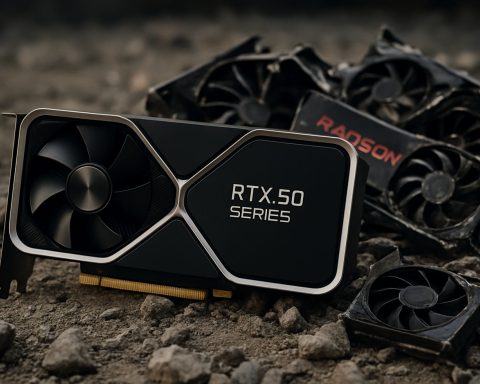- Quantum computing is transforming into a commercial reality, impacting industries like pharmaceuticals and logistics.
- IonQ uses trapped-ion technology, operating at room temperature, and has a market cap of $5.4 billion.
- IonQ’s revenues are expected to grow from $43.1 million in 2024 to $97 million in 2025, driven by partnerships with Microsoft and Amazon.
- Rigetti Computing utilizes superconducting qubits with rapid gate speeds, offering a potential industry standard for fast calculations.
- Despite its smaller 2024 revenue of $10.8 million, Rigetti’s stock rose 700%, supported by its 84-qubit Ankaa-3 system.
- IonQ’s growth appeals to investors looking to capitalize on the emerging quantum computing market.
- The article suggests quantum computing is becoming a fundamental part of modern technology’s evolution.
In the labyrinth of modern technological advancement, quantum computing is the blazing torch lighting the path forward. This extraordinary realm isn’t just promising—it’s rapidly transforming into a commercial reality with the potential to revolutionize industries from pharmaceuticals to logistics. At the helm of this technological surge, IonQ and Rigetti Computing stand as titans, each wielding unique innovations.
Venture deeper into the universe of IonQ, where ions are deftly held in a 3D space by a custom-designed ion trap. This trapped-ion technology allows for room temperature operations by harnessing the power of electrically charged atoms as qubits. These qubits, operating under the mystifying principles of superposition, entanglement, and interference, promise computations that classical systems can only dream of achieving. Boasting a market cap of $5.4 billion, IonQ dwarfs its competitors, holding strong with a roster of major clients navigating drug discovery and engineering simulations.
Financially, IonQ is a swift-moving comet, with revenues soaring by 96% in 2024, reaching $43.1 million. The intrigue surrounding this company lies in its strategic collaborations with giants like Microsoft and Amazon, with a forecasted revenue leap to $97 million in 2025—a nod to the gripping potential of its data-center-friendly innovations.
Yet, where IonQ refrains from superconducting qubits, Rigetti Computing embraces them with vigor. Powering through the frontier with a pioneering vertically integrated model, Rigetti takes command from chip design to cloud delivery. Its superconducting qubits boast gate speeds of mere nanoseconds, forging a path that traditional ion systems may struggle to follow. This speed and precision could make Rigetti’s approach the industry standard for applications demanding rapid calculations.
Despite generating a comparatively modest $10.8 million in 2024, Rigetti’s stock has surged with fervent optimism, reflecting a staggering 700% increase by last year’s end. With a solid cash foundation and the groundbreaking 84-qubit Ankaa-3 system ready to drive growth, Rigetti’s strategy could well redefine its trajectory in the quantum sphere.
In weighing these titans of quantum innovation, IonQ stands out with a more dynamic growth narrative, appealing to investors eager to capture its long-term potential. As the galaxies of technology and commerce intertwine more tightly, IonQ’s strategy could well lead to a luminescent future. For those daring enough to explore—and invest—the cosmos of quantum computing, IonQ presents an enticing opportunity worth considering, especially amidst economic fluctuations where adaptability is key.
This unfolding tale of technological evolution invites us all to reflect on an exhilarating prospect: the limitless possibilities as quantum computing moves from mere fantasy to an anchor of modern reality.
Quantum Computing: Unveiling the Future of Technology with IonQ and Rigetti
IonQ and Rigetti: Pioneers in Quantum Computing
The emergence of quantum computing marks a pivotal moment in technological evolution, promising transformative advancements across various industries. At the forefront of this revolution are IonQ and Rigetti Computing, two companies leading the charge with their innovative approaches.
How IonQ’s Trapped-Ion Technology Works
IonQ leverages trapped-ion technology, which uses ions held in a 3D space by an ion trap to perform computations at room temperature. This method offers several advantages:
– Stability: Trapped ions are less susceptible to environmental noise, ensuring more reliable qubit operations.
– High Fidelity: The technique allows for high-fidelity quantum gates, which are crucial for accurate computations.
– Scalability: IonQ’s design aims to scale effectively, overcoming one of the critical challenges in quantum computing.
Rigetti’s Superconducting Qubits: Speed and Precision
In contrast, Rigetti Computing opts for superconducting qubits, known for:
– High-Speed Operations: Their gate speeds are incredibly fast, operating in nanoseconds, which is beneficial for applications requiring quick calculations.
– Integration: Rigetti’s fully integrated model, from chip design to cloud delivery, streamlines the development and deployment of quantum systems.
Industry Applications and Market Outlook
Quantum computing’s potential impact spans several sectors:
– Pharmaceuticals: Companies are exploring quantum computing for drug discovery, which could drastically reduce time and costs.
– Logistics and Optimization: Quantum algorithms can enhance supply chain efficiency by solving complex optimization problems.
With IonQ expecting revenues to reach $97 million by 2025 and Rigetti projecting growth with its 84-qubit Ankaa-3 system, the market outlook is promising. According to a report by Allied Market Research, the quantum computing market is expected to grow exponentially, with increasing investments from tech giants and startups alike.
Real-World Use Cases
1. Drug Discovery: Quantum computing can simulate molecular interactions at unprecedented speeds, facilitating new drug development.
2. Cryptography: Its ability to solve complex problems quickly positions quantum computing as both a potential threat and tool in cybersecurity.
3. Financial Modeling: Quantum algorithms can improve risk assessment and financial forecasting.
Controversies and Limitations
Despite its promise, quantum computing faces several challenges:
– Error Rates: Current quantum systems have high error rates, requiring significant advancements in error correction.
– Scalability: While IonQ and Rigetti aim to scale their technologies, achieving large-scale quantum computing remains elusive.
– Cost: The development and maintenance of quantum computers are expensive, potentially limiting widespread adoption.
Future Predictions
Experts believe that within the next decade, quantum computing will become an integral part of certain industries, leading to breakthroughs in artificial intelligence and machine learning.
Quick Tips for Investors
1. Diversification: Invest in a portfolio of quantum computing firms to mitigate risks.
2. Stay Informed: Follow industry trends and developments to make informed investment decisions.
3. Long-Term Vision: Given its nascent stage, quantum computing investments may require a long-term outlook.
Conclusion
As quantum computing transitions from theoretical to practical applications, IonQ and Rigetti are positioned as leaders in this domain. By understanding their technologies, market potential, and limitations, stakeholders can better navigate this rapidly evolving landscape.
For more insights and the latest updates on quantum computing, visit IonQ and Rigetti.












